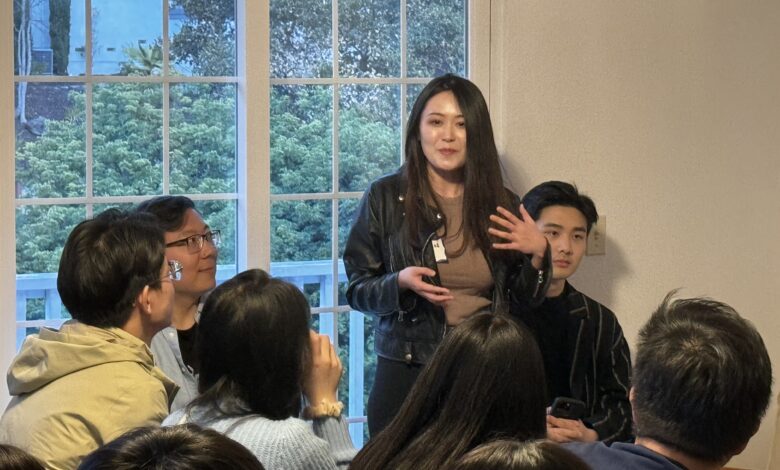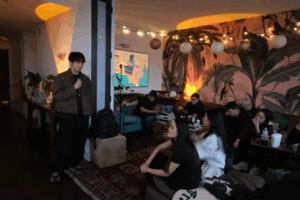
In a private closed-door conversation with a few reporters from major technology media, Yuyan Duan, founder of the AI+ community, offered rare and candid insights into the evolving landscape of AI agents, vertical AI, and the shifting realities of entrepreneurship in Silicon Valley.
Yuyan, who has been in the U.S. for over a decade and has built AI+ into a leading platform for AI founders and investors, spoke openly about what she sees from her vantage point at the frontier of AI innovation and startup culture.
Yuyan (right corner) in an AI panel cohosted by PLUG AND PLAY and AI+.
“We’re no longer in the era of building general-purpose tools and hoping they fit,” Yuyan said. “The future of AI belongs to vertical agents — precision tools that deeply understand industries, workflows, and user behaviors.”
The Reality Behind the AI Agent Boom
When asked about the overwhelming interest in AI agents in Silicon Valley — where countless startups now claim to build agent platforms — Yuyan was clear-eyed.
“Is it overheated? In a way, yes. But it’s like the internet bubble of 2000. Just because there’s a bubble doesn’t mean the underlying shift isn’t real,” she said.
According to Yuyan, the general-purpose agent platforms many are building — flexible agents that promise to do anything for anyone — are unlikely to survive.
In her view, the true opportunities lie in building vertical agents — tightly scoped AI systems optimized for specific industries like law, finance, or healthcare.
Rather than relying on broad frameworks, Yuyan argued that success in the agent space will come from mastery of specific workflows and deep product focus.
“What wins is not just building another layer over a foundation model,” she explained. “It’s embedding deeply into a user’s daily workflow — understanding their pain points at every step, and solving real problems better than any generic tool ever could.”
Yuyan also emphasized that agent building is a grind, requiring not just smart engineering, but relentless product iteration:
“Vertical agents are a product problem. They demand deep user understanding, detailed workflow mapping, brutal A/B testing, and iteration cycles that are almost obsessive.”
Why Vertical AI is the Next SaaS
Yuyan believes the AI industry is undergoing a structural transition similar to what SaaS underwent twenty years ago.
She referred to this as the rise of “Vertical AI” — the idea that instead of broad platforms, the next generation of AI companies will build precision-targeted applications for specific sectors.
“Vertical AI is the new SaaS,” she said. “In the past, SaaS standardized workflows. Now, vertical AI will accelerate and customize them with intelligence.”
Rather than sprawling suites like Salesforce or Hubspot, Yuyan predicts the most successful AI companies will offer “all-in-one verticalized solutions” — powerful, lightweight systems that collapse entire workflows into simpler, faster, and more intelligent processes.
She pointed out that companies like Cursor and Replit have already proven that niche-focused agents can carve out real market share, despite the dominance of foundation model giants.
“You don’t need to own a foundation model to win. You need to own the workflow,” Yuyan said.
Entrepreneurship in Silicon Valley: Resilient but Different
Despite broader economic challenges, Yuyan observed that entrepreneurial energy in Silicon Valley remains strong — though it looks different than before.
“Founders today are more data-driven, more product-obsessed, and frankly, less romantic,” she said. “You have to ship real systems. You can’t just talk vision anymore.”
She also noted that Silicon Valley investors are increasingly focused on startups that can demonstrate defensibility through data, proprietary workflows, or specialized talent — especially in AI.
“Today, defensibility is three things: unique data, compute advantage, and team capability,” she said. “If you don’t have one of those, you’re building on sand.”
When asked about the recent surge of Asian AI founders making their mark in the U.S., Yuyan pointed to the success of companies like DeepSeek and Manus as pivotal moments.
“There’s now a recognition, even among Silicon Valley VCs, that Asian founders are not just fast — they bring incredible product sense and iteration discipline,” she observed. “DeepSeek didn’t just ship a model. It shifted perceptions.”
AI+’s video-generation AI private event with Runway, Midjourney, Pika Labs, etc
A New Playbook for AI Founders
Throughout the conversation, one message was clear:
The age of broad, generic platforms is ending. The winners of the next AI era will be those who move fast, listen deeply to users, and embed themselves into specific industries.
“The future of AI isn’t about building another generic chatbot,” Yuyan said. “It’s about building intelligent systems that understand one thing — and do it better than anyone else.“
As the AI world accelerates into its next phase, communities like AI+, and voices like Yuyan Duan’s, are providing a critical blueprint: focus, precision, and relentless product execution.
In an industry often clouded by hype, Yuyan’s perspective cuts through — reminding founders and investors alike that real value still comes from building deeply, not loudly.


